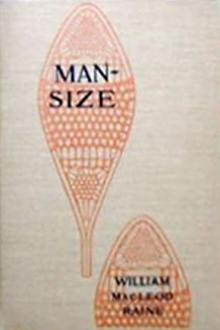Laughing Bill Hyde and Other Stories by Rex Beach (ebook smartphone .TXT) 📗

- Author: Rex Beach
Book online «Laughing Bill Hyde and Other Stories by Rex Beach (ebook smartphone .TXT) 📗». Author Rex Beach
"What?"
"Sure. They're gettin' together at old Port Lewis to run races this week. One tribe or the other goes broke and walks home every year. If we could meet up with the winnin' crowd, down on the La Plata—"
I didn't have to say no more, for I had a hackamore on Mike's attention right there, and he quit climbin' the "G" string and put up his box.
The next day we traded out of the tooth business and rode south down the old Navajo trail. We picked a good campin' spot—a little "flat" in a bend of the river where the grazin' was good—and we turned the ponies out.
We didn't have to wait long. A few evenings later, as we et supper we heard a big noise around the bend and knew our visitors was comin'. They must of had three hundred head of horses, besides a big outfit of blankets, buckskin, baskets, and all the plunder that an Injun outfit travels with. At sight of us in their campin'-place they halted, and the squaws and the children rode up to get a look at us.
I stepped out in front of our tent and throwed my hand to my forehead, shading my eyes—that's the Injun sign of friendship. An old chief and a couple of warriors rode forrad, Winchester to pommel, but, seein' we was alone, they sheathed their guns, and we invited 'em to eat.
It didn't take much urgin'. While we fed hot biscuits to the head men the squaws pitched camp.
They was plumb elated at their winnin' up at Fort Lewis, and the gamblin' fever was on 'em strong, so right after supper they invited us to join 'em in a game of Mexican monte. I let Mike do the card-playin' for our side, because he's got a pass which is the despair of many a "tin-horn." He can take a clean Methodist-Episcopal deck, deal three hands, and have every face card so it'll answer to its Christian name. No, he didn't need no lookout, so I got myself into a game of "bounce the stick," which same, as you prob'ly know, is purely a redskin recreation. You take a handful of twigs in your hand, then throw 'em on to a flat rock endways, bettin' whether an odd or an even number will fall outside of a ring drawed in the dirt. After a couple of hours Mike strolled up and tipped me the wink that he'd dusted his victims.
"Say," he began, "there's the niftiest chicken down here that I ever see."
"Don't start any didos with the domestic relations of this tribe," I told him, "or they'll spread us out, and spread us thin. Remember, you're here on business bent, and if you bend back and forrads, from business to pleasure, and versy visa, you'll bust. These people has scrooplous ideas regardin' their wives and I respect 'em."
"She ain't married," Mike told me. "She's the chief's daughter, and she looks better to me than a silver mine."
Durin' that evening we give the impression that we was well heeled, so the tribe wasn't in no hurry to break camp on the following morning.
Along about noon I missed Mike, and I took a stroll to look for him. I found him—and the chief's daughter—alongside of a shady trout pool. She was weavin' a horsehair bracelet onto his wrist, and I seen the flash of his ring on her finger. Mike could travel some.
He was a bit flustered, it seemed to me, and he tried to laugh the matter off, but the girl didn't. There was something about the look of her that I didn't like. I've seen a whole lot of trouble come from less than a horsehair bracelet. This here quail was mebbe seventeen; she was slim and shy, and she had big black eyes and a skin like velvet. I spoke to Mike in words of one syllable, and I drug him away with me to our tent.
That afternoon some half-grown boys got to runnin' foot-races and Mike entered. He let 'em beat him, then he offered to bet a pony that they couldn't do it again. The kids was game, and they took him quick. Mike faked the race, of course, and lost his horse, that bein' part of our progam.
When it was all over I seen the chief's daughter had been watchin' us, but she didn't say nuthin'. The next mornin', however, when we got up we found a bully pinto pony tied to one of our tent stakes.
"Look who's here," said I. "Young Minnie Ha-ha has made good your losin's."
"That pony is worth forty dollars," said Mike.
"Sure. And you're as good as a squaw-man this minute. You're betrothed."
"Am I?" The idy didn't seem to faze Mike. "If that's the case," said he, "I reckon I'll play the string out. I sort of like it as far as I've gone."
"I wish she'd gave us that cream-colored mare or hers," I said. "It's worth two of this one."
"I'll get it to-day," Mike declared. And sure enough, he lost another foot-race, and the next morning the cream-colored mare was picketed in front of our tent.
Well, this didn't look good to me, and I told Mike so. I never was much of a hand to take money from women, so I served a warnin' on him that if we didn't get down to business pretty quick and make our clean-up I proposed to leave him flat on his back.
That day the young men of the tribe did a little foot-runnin', and Mike begged 'em to let him in. It was comical to see how pleased they was. They felt so sure of him that they began pro-ratin' our belongin's among one another. They laid out a half-mile course, and everybody in camp went out to the finish-line to see the contest and to bet on it. The old chief acted as judge, bookmaker, clerk of the course, referee, and stakeholder. I s'pose by the time the race was ready to start there must of been fifty ponies up, besides a lot of money, but the old bird kept every wager in his head. He rolled up a couple of blankets and placed 'em on opposite sides of the track, and showed us by motions that the first man between 'em would be declared the winner. All the money that had been bet he put in little piles on a blanket; then he give the word to get ready.
I had no trouble layin' our money at one to five, and our ponies at the same odds; then, when everything was geared up, I called Mike from his tent. Say, when he opened the fly and stepped out there was a commotion, for all he had on was his runnin'-trunks and his spiked shoes. The Injuns was in breech-cloths and moccasins, and, of course, they created no comment; but the sight of a half-nekked white man was something new to these people, and the first flash they got at Mike's fancy togs told 'em they'd once more fell a victim to the white man's wiles.
They was wise in a minute, and some of the young hot-bloods was for smokin' us up, but the chief was a sport—I got to give the old bird credit. He rared back on his hind legs and made a stormy palaver; as near as I could judge he told his ghost-dancers they'd been cold-decked, but he expected 'em to take their medicine and grin, and, anyhow, it was a lesson to 'em. Next time they'd know better'n to monkey with strangers. Whatever it was he said, he made his point, and after a right smart lot of powwowin' the entertainment proceeded. But Mike and me was as popular with them people as a couple of polecats at a picnic.
Mike certainly made a picture when he lined up at the start; he stood out like a marble statue in a slate quarry. I caught a glimpse of the chief's daughter, and her eyes was bigger than ever, and she had her hands clinched at her side. He must have looked like a god to her; but, for that matter, he was a sight to turn any untamed female heart, whether the owner et Belgian hare off of silver service or boiled jack-rabbit out of a coal-oil can. Women are funny thataway.
It's a pot-hunter's maxim never to win by a big margin, but to nose out his man at the finish. This Mike did, winnin' by a yard; then he acted as if he was all in—faked a faint, and I doused him with a sombrero of water from the creek. It was a spectacular race, at that, for at the finish the runners was bunched till a blanket would of covered 'em. When they tore into the finish I seen the chief's girl do a trick. Mike was runnin' on the outside, and when nobody was watchin' her the little squaw kicked one of them blanket bundles about two feet down the course, givin' Mike that much the "edge." She done it clever and it would have throwed a close race.
Them savages swallered their physic and grinned, like the chief had told 'em, and they took it standin' up. They turned over the flower of their pony herd to us, not to mention about six quarts of silver money and enough blankets to fill our tent. The old chief patted Mike on the back, then put both hands to his temples with his fingers spread out, as much as to say, "He runs like a deer."
Bimeby a buck stepped up and begun makin' signs. He pointed to the sun four times, and we gathered that he wanted us to wait four days until he could go and get another man.
Mike tipped me the wink, sayin': "They're goin' after the champeen of the tribe. That phony faint of mine done it. Will we wait? Why, say, we'd wait four years, wouldn't we? Sweet pickin's, I call it. Champeen, huh?"
"For me, I'd wait here till I was old folks," I said. "I don't aim to leave these simple savages nothin'. Nothin' at all, but a lot of idle regrets."
Well, sir, there was a heap of excitement in that camp for the next three days. All them Injuns done, was to come and look at Mike and feel of his legs and argue with one another. The first night after the race Mike tuned up his guitar, and later on I heard snatches of the "Spanish Fandango" stealin' up from the river bank. I knew what was on; I knew without lookin' that the old chief's girl was right there beside him, huggin' her knees and listenin' with both ears. I didn't like to think about it, for she was a nice little yearlin', and it looked to me like Mike was up to his usual devilment. Seemed like a low-down trick to play on an injunoo like her, and the more I studied it the warmer I got. It was a wonderful night; the moonlight drenched the valley, and there was the smell of camp-fires and horses over everything—just the sort of a night for a guitar, just the sort of a night to make your blood run hot and to draw you out into the glitter and make you race with your shadow.
When Mike moseyed in, along about ten o'clock, he was plumb loco; the moon-madness was on him strong. His eyes was as bright as silver coins, and his voice had a queer ring to it.
"What a night!" said he. "And what a life this is Lord! I'm tired of pot-huntin'. I've trimmed suckers till I'm weary; I've toted a gold brick in my pocket till my clothes bag. I'm sick of it. I'm goin' to beat this Injun champeen, take my half of our winnin's, sell off the runty ones, and settle down."
"Where do you aim to settle?" I inquired.
"Oh, anywhere hereabouts. These are good people, and I like 'em."
"You mean you're goin' to turn out with the Injuns?" I inquired, with my mouth open. Mike had led so sudden that he had me over the ropes.
"I'm goin' to do that very little thing," he declared. "I dunno how to talk much Navajo, but I'm learnin' fast, and she got my meanin'. We understand each other, and we'll do better as time goes on. She calls me 'Emmike'! Sweet, ain't it?" He heaved a sigh, then he gargled a laugh that sounded like boilin' mush. "It ain't often a feller like me gets a swell little dame that worships





Comments (0)